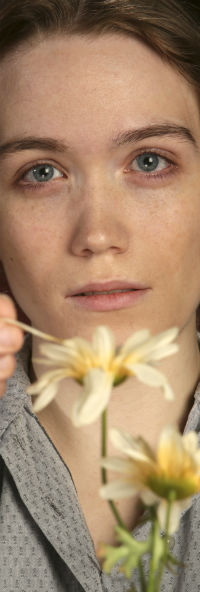
 |
 |
|
Theatre
at UBC Dates and Venue 23 Jan - 8 Feb 2014, 7:30 pm | TELUS Studio Theatre, Chan Centre for the Performing Arts, Crescent Rd., UBC Director Kathleen Duborg Set Design Elliott Squire Sound Design Daniel Tessy Costume Design Siân Morris Lighting designLauren Steward Stage Manager Ndola Hutton Reviewer Elizabeth Paterson |
||||||||||||||||||||||||||||||||||
|
The blue backdrop, facetted with the colours of water, is a constant presence in Theatre at UBC’s current production of The Seagull, whether the scene takes place indoors or out. It is a reminder partly of the rural setting, but also of the values of the natural world as both symbol and a shaping influence on real life. Konstantin’s earnest, Symbolist play-within-the-play of the first act is an attempt to dramatise this theme, with a script which lays out the bleakness of his own life. Thomas Elms, in an attractive and intelligent take, plays him with a clumsy physical presence which settles as Konstantin grows into his vocation as a professional writer, albeit in a small way. Unlike Konstantin, Masha (Helena Fisher-Welsh) is fully aware of the irony of her position, in love with Konstantin -- who loves Nina (Natasha Zacher) -- and beloved by Medvedenko, (Nick Preston in a steady performance), the poor, kind, but annoyingly self-deprecating schoolteacher. “I am in mourning for my life,” she tells Medvedenko, sardonic, removed and with just the right amount of bitter humour. Later, she seems to lose this dispassion and becomes flatly angry. Kathleen Duborg’s direction explored this Chekhovian mix of laughter and disaster with assurance, clearly laying out the ambiguity of Chekhov’s characters and by and large avoiding melodrama. Arkadina was given spirited life by Mercedes de la Zerda. She held the stage, by turns utterly charming, selfdramatising, wholly self-centred, cruel and, very occasionally, loving and kind. If her bandaging of Konstantin’s headwound was partly an act, her response when her brother Sorin collapsed was genuine. Natasha Zacher’s Nina was a less volatile but hardly more gentle creature. In her determined performance in Konstantine’s play she showed the steely nerve Nina calls on in defying her parents, standing up to Arkadina, and throwing her lot in with Trigorin. The weak-willed Trigorin himself was quietly played by Matt Kennedy with a gentle charm and on occasion a surprising intensity. The theme of unrequited, undying love extends to almost all the characters in the play, including Polina, Masha’s mother and Shamrayev’s wife, who is in love with Dr. Dorn. Naomi Vogt’s resigned Polina was a useful foil to Masha’s rage and Nina’s audacity. Similarly, Daniel Meron played Dr. Dorn with an understated aplomb, elegant, amiable and composed. In contrast, Nathan Cottell’s Shamrayev would have benefitted from a more nuanced approach. Simply shouting won’t make a bully. Costumes by Siân Morris were redolent of period, place and character. And how nice to see a change of clothes for Masha. Good lighting by Lauren Stewart enhanced Elliot Squire’s spare set. Sound design by Daniel Tessy underlined the theme of the natural world. © 2014 Elizabeth Paterson |
||||||||||||||||||||||||||||||||||||
|
|
||||||||||||||||||||||||||||||||||||
|
|
||||||||||||||||||||||||||||||||||||